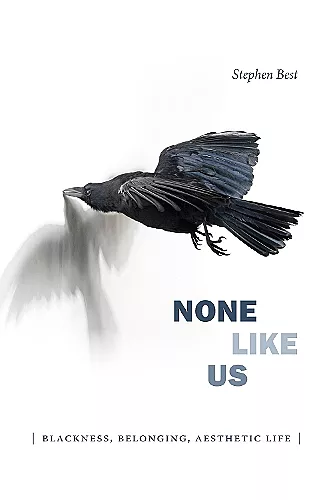None Like Us
Blackness, Belonging, Aesthetic Life
Format:Paperback
Publisher:Duke University Press
Published:26th Nov '18
Should be back in stock very soon
This paperback is available in another edition too:
- Hardback£86.00(9781478001157)

Stephen Best's None Like Us challenges the assumptions of black studies, exploring the complexities of identity shaped by historical trauma and envisioning a queer future.
In None Like Us, Stephen Best presents a thought-provoking examination of the foundational beliefs surrounding black studies and its reliance on the slave past to interpret contemporary black political realities. He challenges the prevailing notion that understanding this historical context is essential for grasping the current state of black identity and activism. Instead, Best introduces the concept of 'melancholy historicism,' likening it to a forensic investigation that seeks to recover a collective identity rooted in a violent origin. This exploration reveals the complexities and contradictions inherent in defining a shared identity based on a traumatic past.
Best asserts that the idea of a cohesive 'we' emerging from such a history is fundamentally flawed. He emphasizes that black identity is shaped through negation rather than through a singular narrative. Drawing inspiration from David Walker's poignant prayer, he argues that the past cannot dictate the future of black identity. By examining the works of artists like El Anatsui and Mark Bradford, as well as influential authors such as Toni Morrison and Gwendolyn Brooks, Best illustrates how their contributions reflect an apocalyptic aesthetics that complicates traditional narratives.
Ultimately, None Like Us seeks to bridge the gap between past and present, offering a fresh perspective that paves the way for a queer future within black studies. By connecting the dots between historical trauma and contemporary expressions of identity, Best invites readers to rethink the frameworks through which they understand black sociality and its potential for transformation.
"None Like Us begins as an intervention into black studies. To accomplish this, it turns to works of art and invention by people whom history has needed to be black. But as it unravels any claim to genre, discipline, field, identity, or audience, the book issues a broad invitation to the reader to see black studies and queer theory, black and queer life, not as identities to inhabit, but as critical perspectives on history and on a present tense that has been so scarred by various melodramas of the self—of its defense, self-possession, and propriety—that have played themselves out on both sides of anti-racist critique." -- Kris Cohen * Public Books *
"Compelling. . . Highly recommended. Upper-division undergraduates through faculty." -- C. E. Bender * Choice *
"Best’s ambitious and well-reasoned thesis confronts the challenge of thinking like a work of art but also of thinking the work of art as an object of critical studies, particularly in Black Studies. ... Responsibly argued and impressively confessional, Best offers thoughtful ways of reconfiguring Black Studies." -- Alice Mikail Craven * Modern Language Review *
“… None Like Us is distinctive as it aims to break with the well-established and perhaps taken-for-granted tenet in the black political present and contemporary black criticism, of a communitarian, shared slave past…. With its themes of identity and belonging, history and the archive, along with a range of visual and literary works, None Like Us would appeal to the interdisciplinary field of Black Studies sociologists; historians, anthropologists, in addition to scholars with an interest in art and visual culture.” -- Karen Wilkes * Visual Studies *
“None Like Us is attempting to produce a version of Blackness that does not need to work through the white gaze and, instead, understands freedom on its own terms. . . . Best prioritizes the present, the surface, and the pleasures of engaging on one’s own terms.” -- Amber Jamilla Musser * Cultural Critique *
"Best picks apart the tropes that are often treated as foregone conclusions: that the heirs of a people made chattel would incur and even embrace the terms foisted upon them, that the first-person plural of Black studies is monolithic." -- Lauren Michele Jackson * The New Yorker *
ISBN: 9781478001508
Dimensions: unknown
Weight: 340g
208 pages